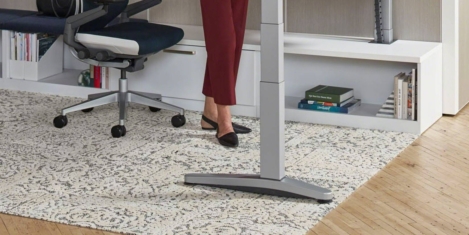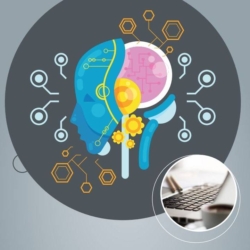August 3, 2018
Workers are becoming more concerned about what jobs robots will replace first
 Fears of robots taking workers’ jobs appear to have lessened over the last year, a new report has suggested. Research from Perkbox and SEMrush examined fears of robots at work according to online searches from January 2015 to June 2018 in the UK and found that in just one year, from 2015 to 2016 the phrase ‘will robots take my job?’ increased from zero to 1,600 average monthly searches. In 2017, the phrase was searched 197,800 times/monthly on average. In 2018 so far, the average has dropped but it remains relatively high regardless (57,833 searches). According to online searches with keyword ‘robots’ and ‘work,’ people are gradually becoming more concerned about what jobs robots will replace first. The phrase ‘what jobs will be replaced by robots? was rarely searched in 2015. However, in 2016-17 the number rose from 200 searches/monthly on average (2016) to 2,400 on average in 2017 (a 1,100 percent increase). More →
Fears of robots taking workers’ jobs appear to have lessened over the last year, a new report has suggested. Research from Perkbox and SEMrush examined fears of robots at work according to online searches from January 2015 to June 2018 in the UK and found that in just one year, from 2015 to 2016 the phrase ‘will robots take my job?’ increased from zero to 1,600 average monthly searches. In 2017, the phrase was searched 197,800 times/monthly on average. In 2018 so far, the average has dropped but it remains relatively high regardless (57,833 searches). According to online searches with keyword ‘robots’ and ‘work,’ people are gradually becoming more concerned about what jobs robots will replace first. The phrase ‘what jobs will be replaced by robots? was rarely searched in 2015. However, in 2016-17 the number rose from 200 searches/monthly on average (2016) to 2,400 on average in 2017 (a 1,100 percent increase). More →









 Long corporate lunches were once the cornerstone of the corporate expense account, but new figures show just 13 percent of today’s workforce claim expenses for lunch at a restaurant, compared to 36 percent of those in the 1970s and 37 percent in the 80s. The data, released by Barclaycard, also claims that just 10 percent claim dinner at a restaurant with a client on their expenses. This is less than half the proportion who did so in the 1960s (34 percent), 70s (27 percent) and 80s (28 percent). Employees are also less likely to catch up with clients over drinks, with just seven percent regularly footing the bill for a round – approximately a quarter of the proportion who say they did so in the 1980s (27 percent). The expense management process itself has also become more formal, with a clear shift to self-service – almost two-thirds of today’s employees file their own expense claims compared to just over a third in the 1960s.
Long corporate lunches were once the cornerstone of the corporate expense account, but new figures show just 13 percent of today’s workforce claim expenses for lunch at a restaurant, compared to 36 percent of those in the 1970s and 37 percent in the 80s. The data, released by Barclaycard, also claims that just 10 percent claim dinner at a restaurant with a client on their expenses. This is less than half the proportion who did so in the 1960s (34 percent), 70s (27 percent) and 80s (28 percent). Employees are also less likely to catch up with clients over drinks, with just seven percent regularly footing the bill for a round – approximately a quarter of the proportion who say they did so in the 1980s (27 percent). The expense management process itself has also become more formal, with a clear shift to self-service – almost two-thirds of today’s employees file their own expense claims compared to just over a third in the 1960s.

























July 31, 2018
Google should be an example to all when it come to interactive workplace design
by Alice Porter • Comment, Workplace design
More →